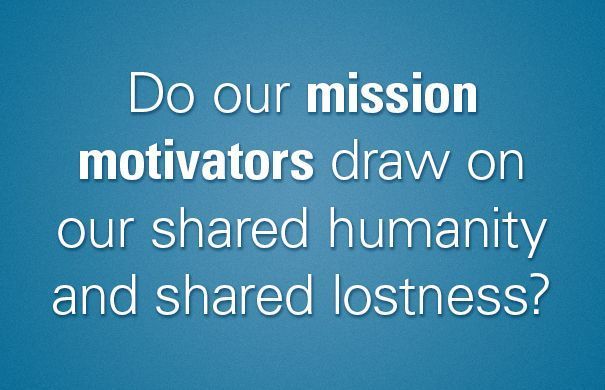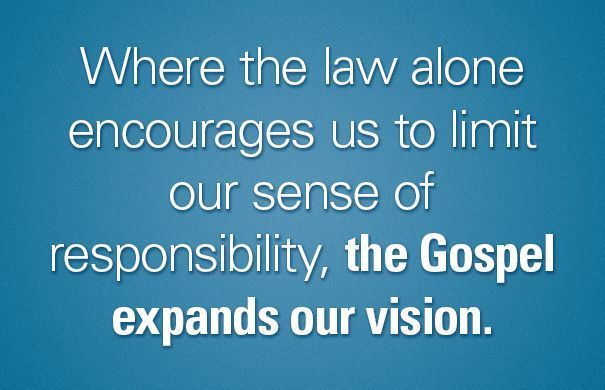In Luke 10 , Jesus calls the crowds to “[love] your neighbor as yourself,” prompting a religious leader to ask, “And who is my neighbor?” Luke tells us the lawyer intended the question to “justify himself.”
How does the question justify the questioner? By limiting those he was responsible to love.
In an earlier post , I shared my belief that, when it comes to mobilizing people toward global missions , we often fail because we tend to wield the law instead of meeting people with the Gospel.
The religious ruler of Luke 10 asks a question that naturally rises out of law-based thinking: How much am I responsible to give? When do I get to punch out and go back to doing what I want to do?
In this post, I’ll look at two ways mission motivators often fall into the same trap, reinforcing categories that rise from “how much is enough” thinking rather than redefining categories in light of the Gospel.
Us vs. Them

Each of us has a natural inclination to view the world through an “us vs. them” lens. We tend to hang out with people who agree with us and to see those with whom we disagree as “other.” We do this in small areas (food, sports teams) and large ones (family, faith).
This isn’t always intentional or malicious. But the results of ignoring our “us vs. them” lens are problematic.
Think about the way that we often talk about an unreached people group, an undeveloped village or a community aggressively opposed to Christianity. Do our mission motivators draw on our shared humanity and shared lostness, or do they play up the differences between “us and them”? Do we play to our desire to do good, to be the world’s savior?
The law — left to itself — draws a sharp line between us vs. them that only the Gospel can overcome.
Law highlights difference and imposes distance. It tells me that I’m better and they’re worse. It tells me that they need me, and isn’t it wonderful that I don’t need them?
But the law is fickle and it will quickly begin to accuse me of not having done enough when that accusation suits.
On the other hand, the Good News of Jesus is that though we were all once far off, Christ drew near and died for the ungodly. The Gospel of Jesus breaks down the wall dividing “us” and “them,” showing us to all be alike in our need for God’s grace and mercy.
The lost, then, are not “them” and “other” but “us,” “me” and “we.” When I think about a distant community without Christ, the Gospel reminds me that, but for the grace of God, that would be me. And the Gospel reminds me that the lost don’t need me; the lost need Christ just as I too need Him.
Here vs. There

Just as we naturally see the world in “us vs. them” categories, we’re naturally inclined to see the world through a “here vs. there” lens.
Some “here vs. there” thinking is unavoidable and even appropriate. Challenges to the advance of the Gospel are different in different locations. Cultural differences are real.
But we often overemphasize these differences.
We in the missions world are notorious for elevating international work — especially to unreached peoples — over domestic work. Think of the famous Oswald Smith quote, “No one has the right to hear the Gospel twice, while there remains someone who has not heard it once.”
Others have focused on domestic ministry and argued we are wrong to overlook local needs on our way to serve those an ocean away.
The Law encourages this kind of division because, after all, I want a law I can fulfill. Creating neat categories of “here” and “there” lets me focus on one thing to the exclusion of something else. It also encourages me to elevate those with whom I agree and villainize those who disagree with me.
But God’s mission can’t be boiled down to the binary categories of “here” or “there.” All of our world’s lostness and brokenness — near and far — matters to God. And all God’s people are called to reach all who need Him, regardless of where we happen to sleep at night.
Christians aren’t called to reach the “here” or the “there.” We’re called to reach both the “here” and the “there.”
The point of the Parable of the Good Samaritan is just this: The “neighbor” God calls me to love isn’t limited by social or ethnic markers, and real fulfillment of God’s law manifests itself in a love for neighbors that flows from the love of God.
Sin is sin. Gospel is Gospel. People are people. God’s work is God’s work. Regardless of geography. Limiting missions to whatever we most deeply resonate with neither does justice to the enormity of the task at hand nor to the greatness of the God we serve.
Where the law alone encourages us to limit our sense of responsibility, the Gospel expands our vision. And — thanks be to God — the Gospel also brings with it the truth of Christ’s work on our behalf and the power of God’s Spirit to engage this enlarged vision of mission.
So…What Should We Do?
I started both posts in this series by pushing back on our desire for quick fixes. But all of this might leave you wondering, if there is no silver bullet for these challenges, what can be done?
In this case, I believe the Reformed tradition has a helpful exhortation for us all.
Reformed Christians love to talk about the ordinary means of God’s grace for us as believers: scripture, prayer and sacraments. They believe that, while God gave us all we need in Christ, it is through the regular participation in these three areas that we continually receive what we need to be God’s people in God’s world.
But here’s where people often get disappointed: The ways we experience these means of grace are, by and large, boring.
Sometimes God speaks great truths that are profound and timely. Most of the time, however, we encounter the quiet, simple truths of Scripture and are changed gradually over time as Christ, by His Spirit, applies those truths to our experience and conforms us more and more to the image of Christ.
We encounter these means of grace as we study Scripture and hear it clearly taught. We pray personally and corporately and are reminded of how God wants His world to look.
We celebrate communion with brothers and sisters and we’re reminded of Christ’s finished work on our behalf and His grace in welcoming us into His family. And we are sent from the table to love and serve those who don’t yet know Him.
What does all of this mean for those of us who want to motivate God’s people towards global missions ?
Go to church. Read Scripture and encourage others to do the same. Preach and teach the truth of God’s mercy and grace, and the ways that this grace calls us to engage the world. Pray lots. Be part of the life of your church and help others to do the same.
This ministry takes time, but there is no solution apart from, as Eugene Peterson put it, “A long obedience in the same direction.” In the end, Peterson’s own ministry is a good encouragement to us:
“I was neither capable nor competent to form Christ in another person, to shape the life of discipleship in man, woman or child. That is supernatural work, and I am not supernatural. Mine was the more modest work of Scripture and prayer — helping people listen to God speak to them from the Scriptures and then joining them in answering God as personally and honestly as we could in lives of prayer. This turned out to be slow work. From time to time, impatient with slowness, I would try out ways of going about my work that promised quicker results. But after a while it always seemed to be more like meddling in these people’s lives than helping them attend to God.”




















